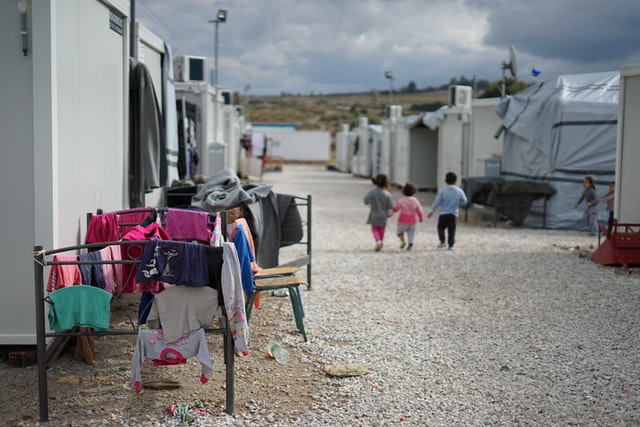Greece Illegally Turns Away Thousands of Vulnerable People Seeking Asylum: A Crisis of Accountability

By Zoe Allen, Sona Circle
Greece accused of illegally expelling refugees
Last week, the New York Times reported claims that Greek authorities have been taking refugees from refugee camps and abandoning them in motorless rafts outside the Greek sea territory border rather than offering them asylum.
The report claims over 1,000 refugees have been expelled in this way, which is illegal under international law that rules that countries have to offer safety to those who are fleeing violence and persecution. The groups, including children and babies, were left floating in the sea, either to be picked up by Turkish border forces or to be lost at sea.
The New York Times report was formed from interviews with refugees who were abandoned by the Greek forces, with further evidence from three independent watchdogs, two academic researchers and the Turkish Coast Guard.
Greece denies claims of abandoning people at sea
Greece has since denied these claims, saying that Greece follows international law and has offered asylum to tens of thousands of people. Rather than saying they will investigate the reports, the Greek Prime Minister Kyriakos Mitsotakis claimed that the reports were fabricated by Turkey.
He further deflected blame onto Turkey by claiming that Turkish border forces had been escorting boats filled with refugees into Greek waters rather than taking them safely to Turkey.
This comes after Turkey recently announced they would not stop refugees from travelling on to Europe, largely through neighbouring Greece, causing large amounts of tension between the country and even resulting in violent border clashes.
UNHCR calls on Greece to investigate the claims
UNHCR confirmed that these allegations had been increasing in number since March and that it appears to be true that refugees “may have been summarily returned after reaching Greece”.
UNHCR, amongst other rights groups, have called for the Greek government to investigate these claims internally, but there is as yet no call or seeming intention to investigate or intervene externally.
However, it is likely UNHCR, as a powerful international body on refugees, will monitor the situation and any further allegations.
NGOs and charities blocked from providing further assistance
Moreover, many NGOs and aid organisations have been blocked from operating in Greece, as legislation was introduced earlier this year to limit the ability of charities to provide support to refugee communities.
This has resulted in further uncertainty, opacity, and lack of accountability for Greek authorities and a lack of protection and aid for refugees in Greece.
This has meant there have been fewer reports on this situation and no immediate response on the ground to prevent this happening. However, as the situation continues to develop – as the New York Times report was only released on August 14th – there may be services put in place to prevent this happening further.
To fully prevent further human rights abuses, it seems likely an investigation by UNHCR will be necessary, however, UNHCR is yet to express an intention to do so.
A note on the terms we use
Refugees are people who have fled persecution, war, famine and serious threats to their life in another country and settled in another country. A person seeking asylum is fleeing these threats and applying to resettle in another country but has not yet been awarded the right to remain. Refugees and asylum seekers cannot return to their home country safely.
We never use the term “illegal migrant” which you may find some people using. Seeking asylum is by definition never illegal under international law, no matter what methods have been used to gain entry to a country. Using “refugee” instead of “migrant” helps differentiate between people who have moved country searching for jobs or wealth (economic migrants) and people who have moved country because they have no other choice if they want to live freely and safely (refugees).
How can we help in the UK?
There are still plenty of organisations working on the ground in Greek’s refugee camps providing essential supplies and services to people in need. You can find a list of organisations to donate to or volunteer for here.
As yet, there are no petitions calling for independent reviews or interventions in Greece or Turkey. However, you can sign the #EuropeMustAct petition started in March, which calls for fair relocation of asylum seekers, oversight of Greek refugee camps and a register of European legal, medical and protection staff to work in Greek camps to support refugees.
It’s also very important that we continue to welcome and support refugees in the UK as well as helping them in mainland Europe. You could donate to major charities helping refugees in the UK, such as British Red Cross or the Refugee Council.
Get involved with Sona Circle?
At Sona Circle Recruitment, we partner with companies to provide paid internships and apprenticeships to refugees, helping to combat an elitist internship culture and the recruitment practices that currently exist. If you know of a company that would be interested in hiring from the dependable refugee workforce, they can get in touch with us here.
You can also show your support by donating on our JustGiving page or by purchasing an Equal Tee from our online shop where all the profits go to supporting refugee employment.
By wearing a #EqualTee you are standing in solidarity with any group in society that has been unfairly treated or discriminated against. This doesn’t end with refugees and asylum seekers, it includes the Black Lives Matter movement, LGBTQ+ rights, gender equality and BAME rights.